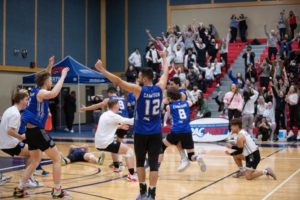The Camosun Chargers men’s volleyball team are heading to nationals later this month after winning in the provincial finals and securing a Pacific Western Athletic Association (PACWEST) gold medal.
Team captain Lorenz Vogel says that the team only found out that just the winner of the provincials goes to nationals right before they left for provincials.
“Our goal was always to win provincials,” says Vogel, “but then it really came down to winning it to actually go to nationals.”

Lorenz says he felt over the moon with this victory after missing the opportunity to go to nationals for the last two years, one of those times because of the pandemic. He says many players have been on the team practicing and growing together for three seasons.
“A few years ago before COVID hit we missed out on going to nationals after having a good lead in a game,” he says. “Now, after winning it and finally achieving it, it was definitely, I wouldn’t say a weight off the shoulders, but it was something that a lot of us had really worked hard for and looked forward to. And to finally have that happen was the best feeling possible.”
Vogel says the team has developed a strong bond—old and new players alike—and he believes that their success this year can be attributed to that.
“We have really good team chemistry and everyone gets along with each other,” he says. “Especially after the whole COVID year of not actually playing, we still managed to take the year seriously and practice hard and I think that helped a lot this year when we started off the season. It wasn’t like we had to start from the beginning. We all get along really well and I think now probably even better than beforehand.”
The national championships will take place in Quebec City from March 24 to 27.
In other Chargers news, Scot Cuachon has been named PACWEST men’s basketball coach of the year. The Chargers men’s basketball team faced a lot of obstacles this season, with three players needing knee surgery, one with a broken ankle, and one with a broken arm, creating a challenging year for Cuachon.
“The approach was to build some confidence in our younger athletes that we normally wouldn’t have put so much reliance on,” says Cuachon, “and to ensure that we understood our roles and our philosophies more thoroughly so that we could follow through with our principles and perform to our abilities.”
Cuachon describes feeling fortunate, humbled, and honoured to have won this award, but says that it hasn’t changed how he views himself as a coach.
“Coaching is always about the people, and, if anything, the only thing the award’s done is reinforced my belief that investing in the people, in their development, and in their success is the only way to approach coaching,” he says.
Cuachon says that, first and foremost, coaching is about building relationships with people “and giving them opportunities, space, and a safety net to grow and learn and fail and do it all over again.”
“And then the second part,” he says, “is that I really enjoy the technical aspect of the sport and the preparation that goes into it, which is, for many that don’t really understand, a year-round process.”
